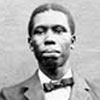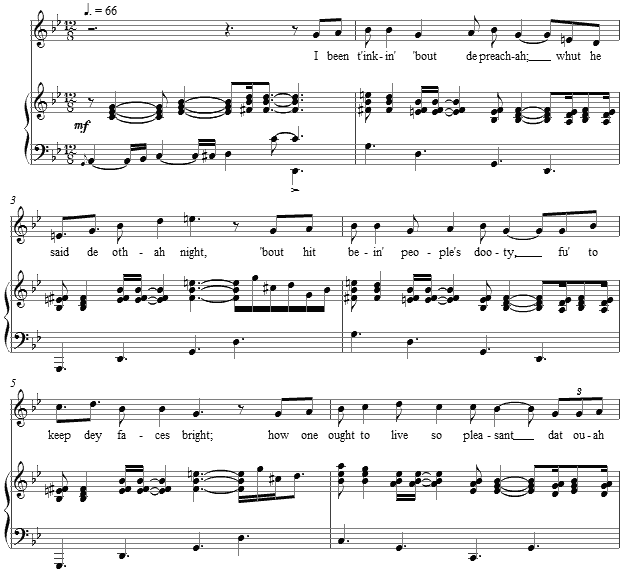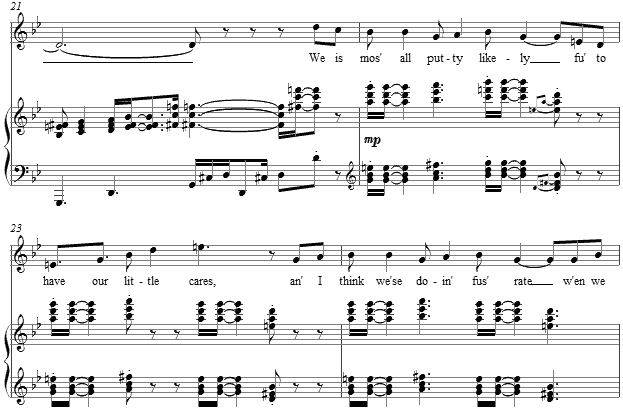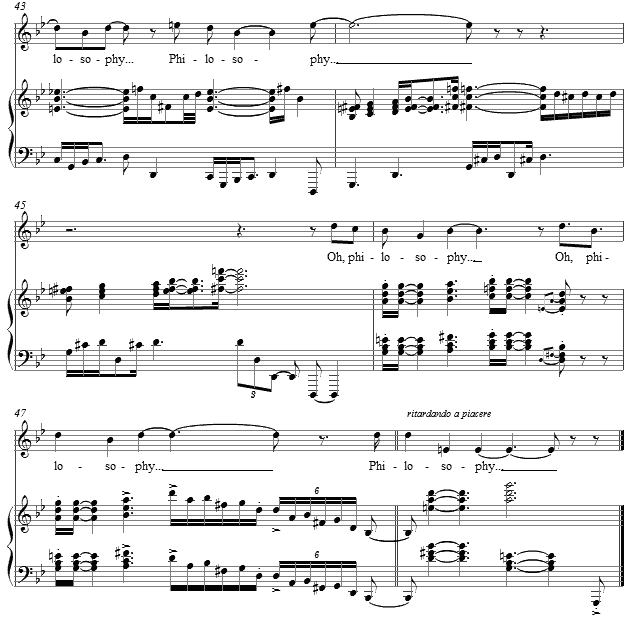Music and Texts of GARY BACHLUND
Vocal Music | Piano | Organ | Chamber Music | Orchestral | Articles and Commentary | Poems and Stories | Miscellany | FAQs
Philosophy - (2009)
Paul Laurence Dunbar
for medium voice and piano
I been t'inkin' 'bout de preachah; whut he said de othah night,
'Bout hit bein' people's dooty, fu' to keep dey faces bright;
How one ought to live so pleasant dat ouah tempah never riles,
Meetin' evahbody roun' us wid ouah very nicest smiles.
Dat 's all right, I ain't a-sputin' not a t'ing dat soun's lak fac',
But you don't ketch folks a-grinnin' wid a misery in de back;
An' you don't fin' dem a-smilin' w'en dey 's hongry ez kin be,
Leastways, dat 's how human natur' allus seems to 'pear to me.
We is mos' all putty likely fu' to have our little cares,
An' I think we 'se doin' fus' rate w'en we jes' go long and bears,
Widout breakin' up ouah faces in a sickly so't o' grin,
W'en we knows dat in ouah innards we is p'intly mad ez sin.
Oh dey 's times fu' bein' pleasant an' fu' goin' smilin' roun',
'Cause I don't believe in people allus totin' roun' a frown,
But it's easy 'nough to titter w'en de stew is smokin' hot,
But hit's mighty ha'd to giggle w'en dey's nuffin' in de pot.[ 6 pages, circa 3' 00" ]
Paul Laurence Dunbar
For more information on Dunbar, please see my setting of his text, Theology. This among many poems in Dunbar's opus is written in dialect, with grammatical errors alongside approximations of pronunciation. As with all languages, regional differences make for the flavor of a place and even a period in history, and this text alongside a number of settings I have composed pays tribute to the differences between men and cultures; it is sincerely hoped that these flavors never be forgotten, as some would "iron out" into a flat panorama of sameness, of correctness and of dullness. That a clarity of commonsense thought leaps out from the poem speaks volumes to me about what plain speaking says so well, while complex and convoluted thought merely clutters up into all too many words.
I was amused by Dunbar's spelling of "t'inkin'," for I recall my own grandmother, an immigrant from Sweden at the end of the 19th century, pronouncing the word quite the same way. In the same way, what came to mind was an attorney of my acquaintance from New York City, who consistently said "st-h-reet," the "h" coming from a German linguistic background two generations before hers. One way in which dialects form in through non-native speakers whose habits become ingrained into regionalisms, and such regional dialects separate us into distinctive groups which I think a wonderful and most interesting part of culture.
The four stanzas of the poem unremarkably become four verse in this setting. The 12/8 meter so reminiscent of swing music carries the rhythms forward as the harmonic rhythm is relatively long and stable. At measure six, as one example, the subdominant breaks from the tonic-dominant, before a solid return to "home." Between verses, the title of the poem is used as a part of the song lyric over a cadential break.
The third verse shows a textural change in the accompaniment, while the vocal line repeats in hymn-like fashion the previous verses' melody.
The final coda repeats the gestures under "Philosophy," as a reminder of the third verse's textures is reprised before bringing the setting to its cadence in G minor with the added major third emphasized by the voice.
The score for Philosophy is available as a free PDF download, though any major commercial performance or recording of the work is prohibited without prior arrangement with the composer. Click on the graphic below for this piano-vocal score.



